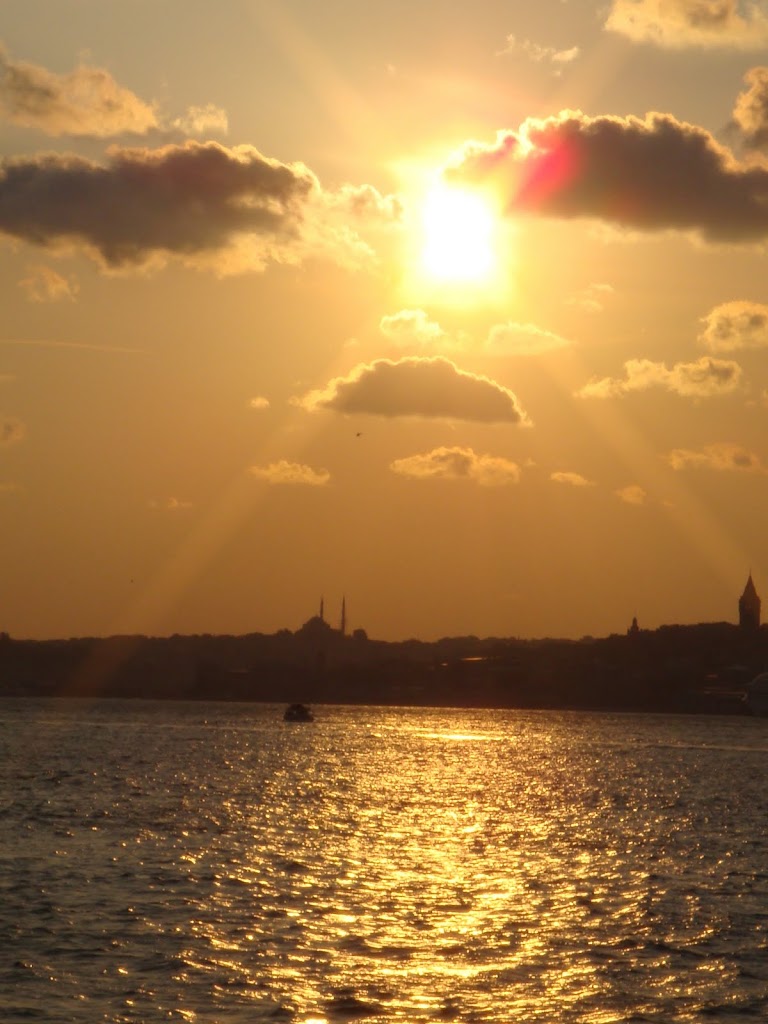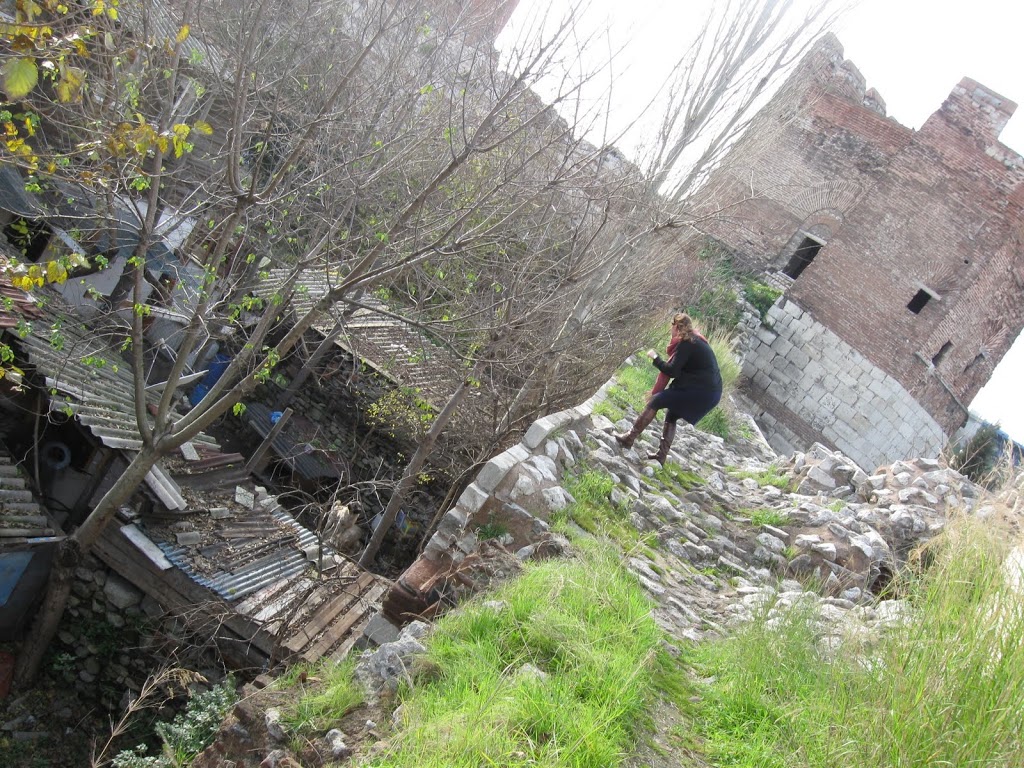For someone who’s spent most of her spare time over the last five years traveling like a penniless bum, I’m very poorly read in the travel classics. I only recently got to Kerouac’s On the Road, that dated instruction manual for the would-be hipster. I liked it, I guess – who doesn’t like the escapism provided by reading about people more dissolute than you will ever be? – but it doesn’t make me long for America. The Road through Denver, New Orleans, New York, and Frisco sounds dull and sordid. Reading about how drunk they all are makes my head hurt. And the diet of apple pie and cheese sounds even less healthy than my current menu of kebabs and dark chocolate.
One thing I have been missing, however, is The Road. There’s just something about a change in the air and having everything I need in a backpack that I find intoxicating. It’s possible to get too much of it – I’d say I was drunk by the Ukraine and nursed my hangover for much of the beginning of my time in Istanbul – but the trip home for Thanksgiving was the equivalent of ibuprofen and a good night’s sleep. I’m ready to start drinking again.

That, and the pollution in Istanbul is getting to me. Artistic wealth, generous inhabitants, and baklava this city has in spades, but emissions controls not so much. My brother Robert is visiting and we spent much of Saturday walking through unexplored neighborhoods and hiking along the top of the 4th century Theodosian walls (the picture to the right is me talking to a dog in the slum next to the northern end of the city walls). Being able to wander aimlessly through centuries of history in a tank top in the middle of winter is a luxury I wouldn’t have even dreamed of in my four years of purgatory in freezing Cambridge. But, greedy as always, I would love to be able to spend the day outside and not feel like I smoked a pack of car-exhaust-flavored cigarettes at the end of it.
And so Saturday night Robert and I caught a bus to Edirne. The city was once the capital of the Ottoman Empire, the base from which Mehmet the Conqueror sent his army to take Constantinople in 1453. Today it is best known for being the border station to Greece and Bulgaria. Oh, and the annual oil-wrestling contests in which mostly naked men cover themselves in olive oil and grope each other. In the words of a friend who went last summer, ‘it’s like the WWF with lube and less clothing.’
The city that most travelers miss – because they are on their way to Istanbul or watching obese oily men perform their homoerotic ballet – has a lot to offer by day and not much by night. I’m taking the word of our hosts Batu and Mutlu (via Couchsurfing, once again) on the night part: there is only one club worth going to, they say, and even that is only really good because you can stop at this sweet kebab stand on your way out. We went. The club walls were covered in fake antiquities. Actually, given the archaeological wealth of this country, they may well have been real. As Eddie Izzard would say, ‘there’re a lot of them about…‘
By day, there are sublimely beautiful mosques to visit, immaculate streets bordered by crumbling houses to meander, and innumerable tea houses to sit at and discuss the future of Turkey. As a border city, it should come as no surprise that the West, and Turkey’s relation to it, dominates the conversation.
The general consensus among the Turks I’ve talked to is that the EU accession process is good for the country. Regardless of whether or not Turkey joins the EU, the process is stimulating reforms that have been a long time coming, such as a revision of the civil code to allow women to work without their spouse’s consent (passed in 2001) and reducing (though not eliminating) the amount of jail time you may serve for ‘insulting Turkishness’ (2002).
Mutlu, whose name translates as Happy, isn’t as overly enamored with Westernization as many of the Istanbullians I know. I imagine he appreciates the above reforms – we didn’t discuss them – but he thinks that Turkey is held back by the IMF debt it accumulated in 2001. Turkey can’t advance, he says, when it doesn’t have the money to invest in major projects. Turkey’s brave new future can only come about when it stands up to the Western institutions telling it how to spend its money. Presumably by defaulting on its debt.
As a fiscal conservative who relies on a sound financial system, I am obliged to say this is a horrible idea. A pragmatist, however, might say Mutlu’s take isn’t altogether crazy. Argentina, after all, massively defaulted on its IMF debt in 2001 – and then enjoyed an internally-financed growth rate of 8% a year from 2003 to 2007. Turkey’s GDP growth in the same period has hovered around 3% a year. A recent article in the NYT argues that ‘strategic default’ (granted, for homeowners, not countries) is beneficial not only for the defaulters, but for the economic system as a whole, because it encourages more strategic bartering.
It isn’t obvious to my brother, who has now been in Turkey for six days, that Turkey is a poor country. ‘This is confusing,’ he said as we walked through one of Istanbul’s lavish malls on Christmas day. ‘Isn’t this a developing country?’ The bus to Edirne, he noted, had better service than planes in America. A walk through some of Istanbul’s slums on Saturday might have tarnished the impression he was getting of Turkey if it hadn’t been the kind of rare gorgeous day that can make life in an uninsulated shack seem refreshingly simple, a la Walden Pond. Thoreau could have set up shop here, I found myself thinking, when we found a mattress inside one of the old watch-towers on the city walls.
I hardly have more cred than my brother when it comes to getting to know Turkey’s gritty side. The brushes with protestors around the IMF/WB meeting (‘A Tale of Two Tuesdays (and anarchists)’) were dramatic, to be sure, but it’s not the kind of stuff that happens every day. I live in chic Cihangir, the traditional haunt of journalists and gentrified artists. The closest I’ve come to Istanbul’s underbelly is a few tranny sightings on Istiklal Caddesi, the modern city’s main drag, and the uncannily perceptive photographs of Sevket Sahintas.
A major factor in my lack of social conscience is my continuing unmastery of the Turkish language. Therefore, in the spirit of this time of year, I am making my first New Year’s Resolutions since 2002: I will learn Turkish, and I will get off the familiar paths I’ve already carved through this city.
To that end, I just emailed Hakan to see if I can enroll in evening courses for January. If I’m going to learn this language and this country, I figure I might as well do it with a chain-smoking anarchist.




 September – my first ferry ride.
September – my first ferry ride. Istanbul is by any objective measure a great place to live. The food is good, the weather better (at least nine months out of the year) and there’s plenty to do. There is a sense of excitement and edginess about this city that I can’t imagine exists other places, or at least not in the same form: where else can you live in such comfort while momentous political change is underway? (Beirut, or Tel Aviv, some might say, but those places are country clubs compared to Istanbul’s titanic sprawl.)
Istanbul is by any objective measure a great place to live. The food is good, the weather better (at least nine months out of the year) and there’s plenty to do. There is a sense of excitement and edginess about this city that I can’t imagine exists other places, or at least not in the same form: where else can you live in such comfort while momentous political change is underway? (Beirut, or Tel Aviv, some might say, but those places are country clubs compared to Istanbul’s titanic sprawl.)  Yet despite all its charms, I haven’t fallen in love with Istanbul. Perhaps this is because love, like taxes, is something I’ve always assumed I’d figure out when I grow up.
Yet despite all its charms, I haven’t fallen in love with Istanbul. Perhaps this is because love, like taxes, is something I’ve always assumed I’d figure out when I grow up. 

 That, and the pollution in Istanbul is getting to me. Artistic wealth, generous inhabitants, and baklava this city has in spades, but emissions controls not so much. My brother Robert is visiting and we spent much of Saturday walking through unexplored neighborhoods and hiking along the top of the 4th century Theodosian walls (the picture to the right is me talking to a dog in the slum next to the northern end of the city walls). Being able to wander aimlessly through centuries of history in a tank top in the middle of winter is a luxury I wouldn’t have even dreamed of in my four years of purgatory in freezing Cambridge. But, greedy as always, I would love to be able to spend the day outside and not feel like I smoked a pack of car-exhaust-flavored cigarettes at the end of it.
That, and the pollution in Istanbul is getting to me. Artistic wealth, generous inhabitants, and baklava this city has in spades, but emissions controls not so much. My brother Robert is visiting and we spent much of Saturday walking through unexplored neighborhoods and hiking along the top of the 4th century Theodosian walls (the picture to the right is me talking to a dog in the slum next to the northern end of the city walls). Being able to wander aimlessly through centuries of history in a tank top in the middle of winter is a luxury I wouldn’t have even dreamed of in my four years of purgatory in freezing Cambridge. But, greedy as always, I would love to be able to spend the day outside and not feel like I smoked a pack of car-exhaust-flavored cigarettes at the end of it.